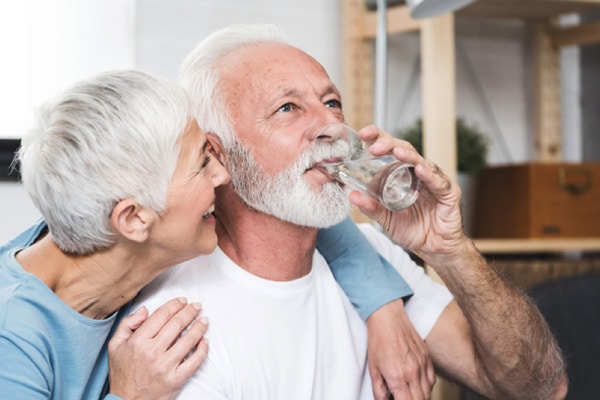As Florida broils under the most intense heat of the year, it’s important for all of us to stay hydrated, but hydration for older adults can be especially challenging for a number of reasons. Senior dehydration can happen quickly and lead to a number of serious health complications. This is because older adults have less water in their bodies, have a lowered ability to keep their bodies’ fluid levels in balance, and have decreased efficiency in the kidneys, among other factors.
At American, Advocate and Whitsyms In-Home Care, we know that understanding the facts about hydration is the best way to ensure that the older adults you love stay healthy this summer. We’ve debunked some of the common misconceptions about hydration for older adults below.
Myth: You can tell you’re at risk for dehydration when you start to become thirsty.
Fact: Older adults often have a diminished sense of thirst, so this is never an appropriate gauge of hydration level. By the time you feel thirsty, your body’s fluid levels have already dropped by as much as 2-3% of your body weight. Better indicators are the color of urine, which should be pale and clear, and the frequency of urination, which should be every few hours.
Myth: Sports drinks are the best way to hydrate after exercising.
Fact: Sports drinks may be recommended for an older adult who has engaged in a strenuous, lengthy workout, or who has experienced vomiting or diarrhea. Sports drinks can be dangerous, however, for seniors with certain types of medical conditions, such as diabetes. Check with the doctor for guidance. In most cases, plain water is the best source of hydration.
Myth: Everyone needs eight cups of water each day.
Fact: There are a number of factors that determine how much fluid each individual needs: age, climate, medications being taken, diet, activity level, etc. Because older adults have fewer water reserves in the body, it’s important to not just drink enough water each day, but to drink at optimal times during the day: first thing in the morning, before meals, and after exercising, for instance. To determine how much water a senior should drink, take 1/3 of the person’s body weight and aim for that many ounces of water daily (i.e., 60 ounces of water for someone who weighs 180 pounds). However, it’s always best to check with the older adult’s doctor for guidance on fluid consumption.
Myth: You can only stay hydrated by drinking fluids.
Fact: If an older adult balks at drinking lots of fluids, there are foods that contain fluids that can help as well, such as watermelon, celery, cucumbers, and soup. Again, checking with the doctor for recommendations is always a good idea.
Myth: Stay away from coffee; it’s dehydrating.
Fact: Until recently, it was believed that caffeine was a diuretic and increased the risk for dehydration. However, researchers have found that drinking up to four cups per day of coffee or other caffeinated beverages showed no dehydrating effects.
Myth: If a senior appears to be dehydrated, have them drink more water.
Fact: Dehydration can be extremely serious, and depending on the symptoms being displayed, treatment may require more than simply taking a drink. Mild dehydration can present as a headache, fatigue, dry mouth, and muscle cramps. If drinking water or a drink containing electrolytes doesn’t resolve the symptoms within 5-10 minutes, get medical help right away. IV fluids and additional interventions may be needed for moderate to severe dehydration, which can include symptoms such as confusion, trouble walking, a fast, weak pulse, dry, sunken eyes, cramping, increased breathing rate, and more.
At American, Advocate, and Whitsyms In-Home Care, we offer referred care providers who can help seniors stay hydrated and healthy. Our services include help with preparing meals, picking up groceries and running other errands, encouraging seniors to drink plenty of fluids and take medications as prescribed, and much more. Each referred care provider will monitor a senior’s condition and report any changes immediately to ensure optimal health and wellbeing.
Contact us to find out more about how our Florida home care experts can help the older adults in your life. Reach out to the office nearest you by clicking the links below to get started:
- American In-Home Care – Serving North, Central, and West Coast of Florida
- Advocate In-Home Care – Serving Southeast and Southwest Florida
- Whitsyms In-Home Care – Serving Southeast and Southwest Florida
State of Florida License and Registration Numbers: 30211518, 30211651, 30211295, 30211390, 30210978, 30211293, 30211382, 30211504, 30211733, 30211535, 30211531, 30211710, 30211709, 30211045, 5661


